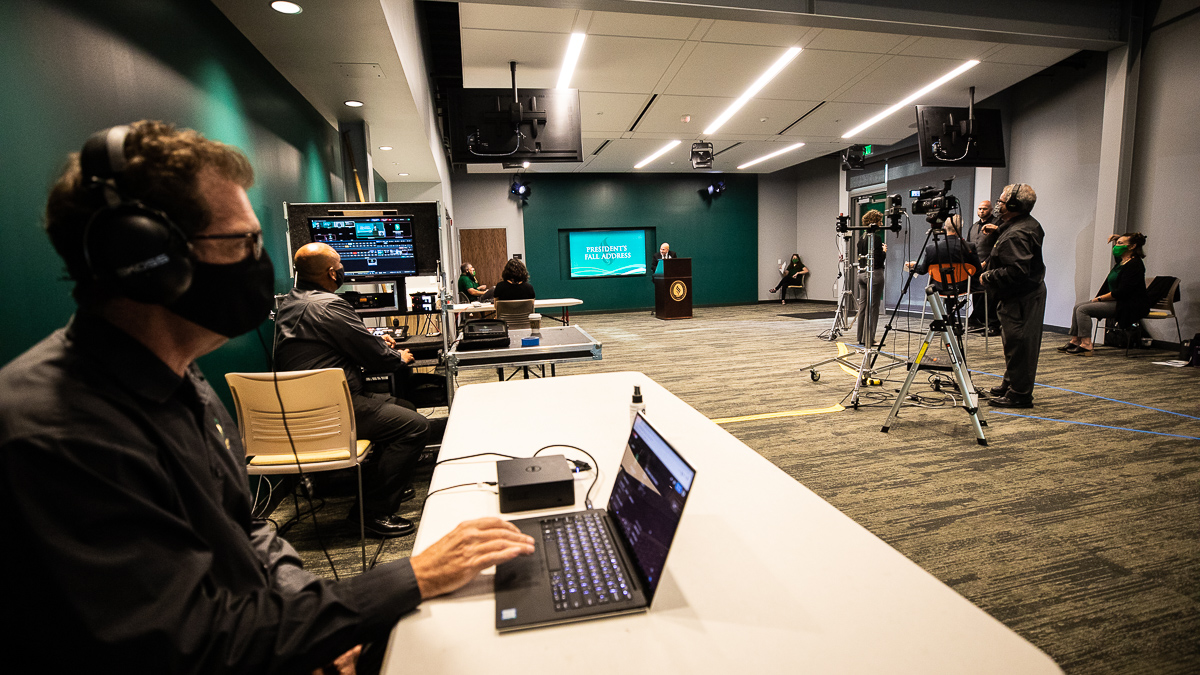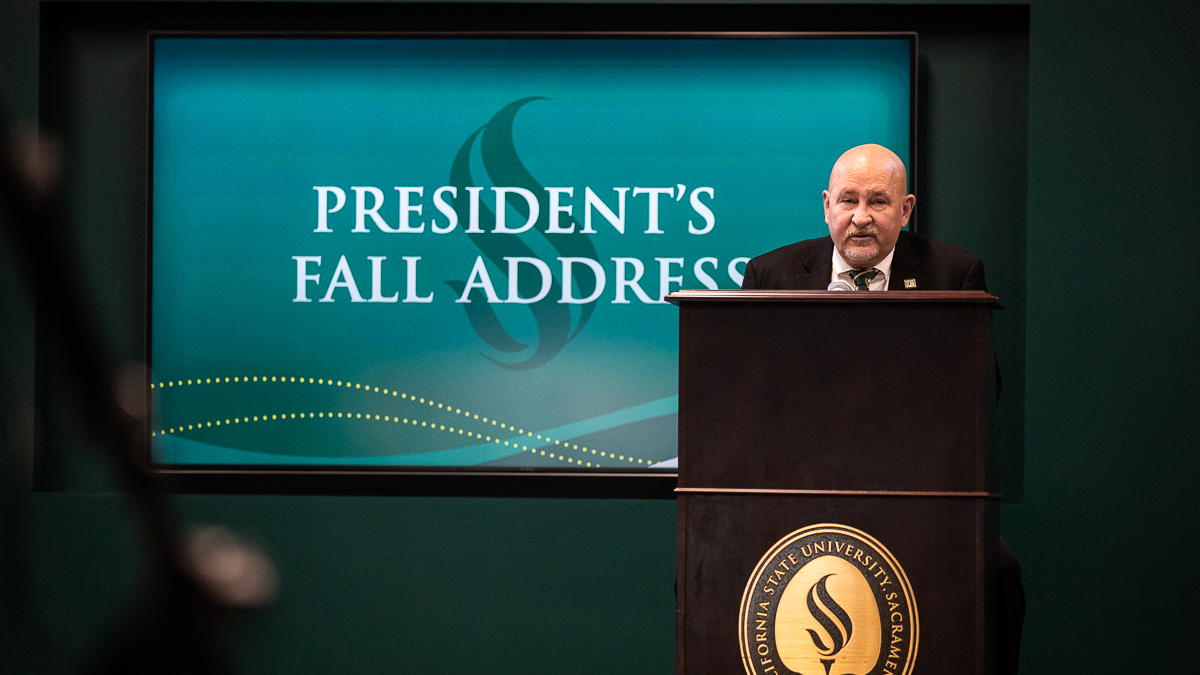 Support and technical staff work to produce the annual Fall Address presented virtually to the University community by President Robert S. Nelsen, at podium, on Thursday, Sept. 3. (Sacramento State/Andrea Price)
Support and technical staff work to produce the annual Fall Address presented virtually to the University community by President Robert S. Nelsen, at podium, on Thursday, Sept. 3. (Sacramento State/Andrea Price)
By Cynthia Hubert
Sacramento State is placing a renewed emphasis on eliminating racial bias and working to create an antiracist environment at the University, President Robert S. Nelsen announced during his annual Fall Address on Thursday, Sept. 3.
Delivering the address online, Nelsen said the University has formed a framework of committees that will focus on battling racism. The seven committees ultimately will join and issue a final plan designed to guide the campus community and put Sac State at the forefront of institutions that are fighting bias, he said.
- See and hear President Nelsen’s complete Fall Address
- Read the transcript of President Nelsen’s Fall Address
Members of the Sac State community will have an opportunity to apply for the committees, which will focus on issues including curriculum, encounters with racial stress and bias, and impacts on the Sacramento region. Details about the groups and their specific areas of focus will be distributed soon.
 President Nelsen shares his vision for the upcoming year during his 2020 Fall Address, delivered virtually on Thursday, Sept. 3. (Sacramento State/Andrea Price)
President Nelsen shares his vision for the upcoming year during his 2020 Fall Address, delivered virtually on Thursday, Sept. 3. (Sacramento State/Andrea Price)Nelsen's address also featured other themes. He discussed at length the University’s efforts to provide a quality education to all students while emphasizing safety during the ongoing coronavirus pandemic.
“Racism, pandemics, budget cuts will not move us away from our mission,” Nelsen said. “We must be a swarm. We must be Hornets.”
Nelsen referred to various Sac State “miracles” that have occurred in recent months despite the abrupt pivot to online learning, the painful realities of racial injustice, and budget challenges caused by the pandemic's impact on the overall economy.
“I often talk about the miracle on J Street,” he said. “This last six months, we have had miracles taking place in living rooms, kitchens, bedrooms, and even closets throughout the Sacramento region,” as students, staffers and faculty sheltered in place, and studied, worked, and taught from home.
Despite the disruptions, good things are happening at Sac State, Nelsen emphasized. He listed several examples:
The University’s “Finish in Four” initiative has helped push four-year graduation rates from 9% in 2016 to 20.4% this year; enrollment is at a record level this fall at 31,735 students; faculty and staff are taking additional training to ensure that students can safely and efficiently pursue their education during the pandemic; and more students are able to enroll in courses when they want and need them this semester thanks to a strategic scheduling program called Hornet Launch.
The total of incoming first-year students taking 14 or more semester credit hours is 91%, a number that "is truly a miracle," Nelsen said, and helps them toward the goal of graduating in four years.
Plans for the semester call for only a few thousand people to be on campus, where safety measures are in place to curb spread of the virus. Residence halls are operating with single-occupancy rooms and strict cleaning and physical distancing rules. Dining options are available but limited.
Virtual instruction is “not going away” soon, Nelsen said. Hybrid courses, in which students alternate studying online and in the classroom, will become a regular part of instruction. Plans are underway to create 155 technologically enhanced “smart classrooms,” he said.
While navigating budget cuts made necessary by the pandemic, Nelsen said Sac State will continue to embrace the five imperatives he established as guiding principles: student success, philanthropy, diversity and inclusion, community engagement, and public safety. They have never been more important, he said, as Sac State responds to the significant challenges, including demands for change in response to the killings by police of unarmed Black people around the country.
In a message to the Sac State community in late May, Nelsen promised nine actions on that front, including hiring an advocate for people experiencing racism and bias on campus. A convocation Tuesday, Sept. 29, is designed to help the community recognize and respond to racism.
The forthcoming committee work is an extension of those efforts, he said. Nelsen also announced that the University is establishing an emergency grant program to support “students experiencing crises due to trauma.” The grant is to be named after George Floyd, a Black man killed by Minneapolis police in May.
At Sac State, “education must be fully accessible and it must be antiracist,” Nelsen said. “We cannot be blind to the racism that we see in our country, in Sacramento, and yes, here on our campus.”
Change cannot happen overnight, he said, but one day “we will be back on campus,” working, teaching, and learning. “Most of all, we will be together as an inclusive and caring community … a model for the nation for what it means to be an antiracist campus.”
Nelsen ended his hour-long speech on an emotional note.
“I believe in you. I do,” he said earnestly, before shouting his trademark coda: "Sac State is No. 1! Stingers up!"
